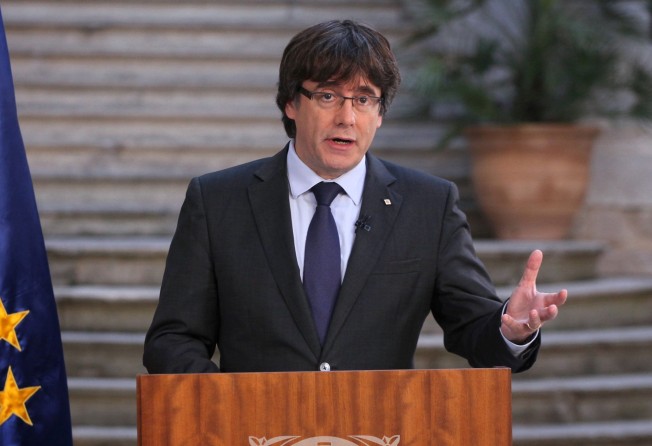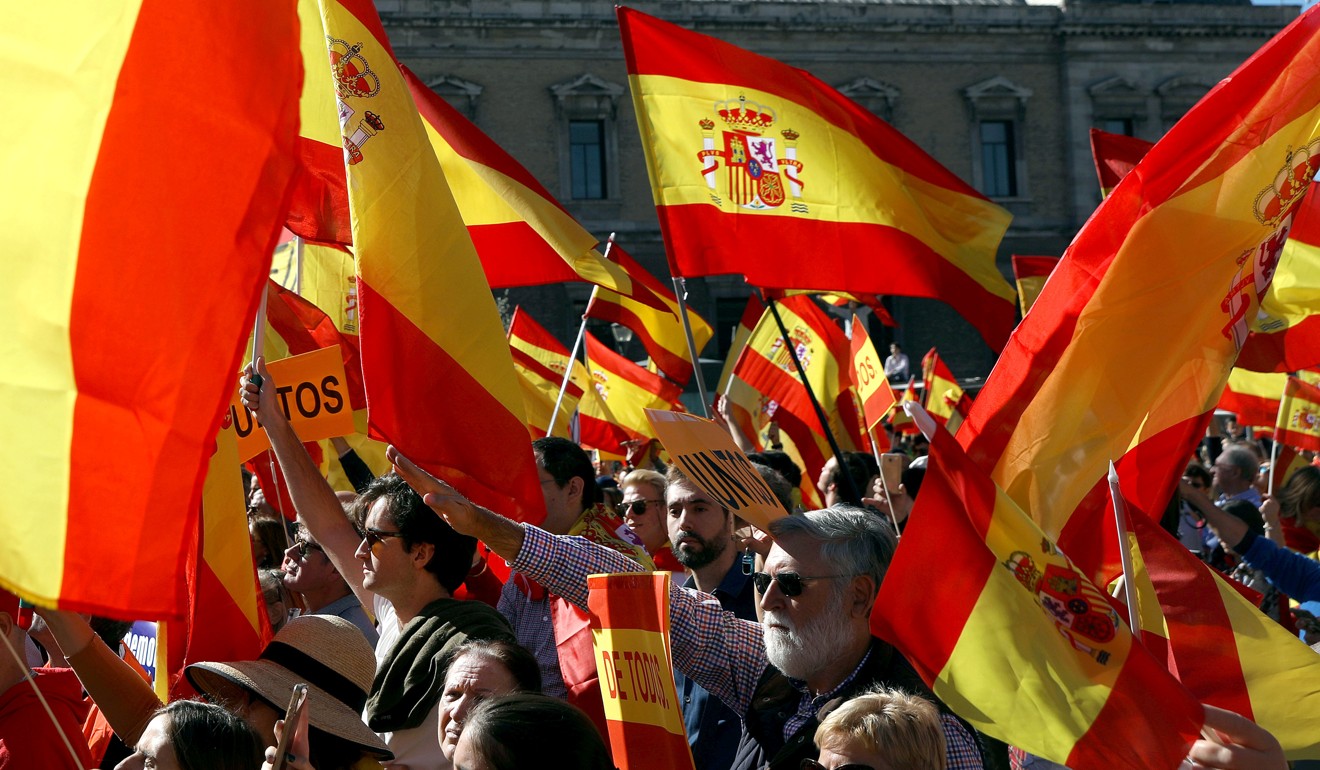Deposed Catalonian leader Carles Puigdemont calls for ‘democratic opposition’ to Madrid and row over secession bid deepens
On Friday, the Catalan parliament declared unilateral independence, prompting prime minister to sack Puigdemont and his executive, dissolve parliament and call snap December 21 regional elections

Catalonia’s secessionist leader on Saturday defiantly called for “democratic opposition” to direct rule imposed by the central government on the semi-autonomous region after its parliament declared unilateral independence.
“The best way to defend what we have achieved to date is democratic opposition to the application of article 155,” Carles Puigdemont, who was officially deposed by Madrid on Friday, said in a carefully worded televised statement that appeared to indicate he did not accept his dismissal.
Puigdemont was referring to the never-before-used constitutional article that gives Madrid the takeover powers, adding he and his team would keep working “to build a free country”.
In his first comments since being deposed as president of Catalonia, flanked by a Catalan and EU flag, he did not clarify whether he would carry on as leader of a new republic that is not recognised by Madrid or abroad.
He signed off as “president of the Catalan government,” implying he considered himself to still officially be head of the semi-autonomous region. He stopped short of signing off as president of the republic, though.
In a cryptic message, Puigdemont also asked Catalans to defend the republic proclaimed by the regional parliament.
“We need to keep defending the stage in which we have entered with a tireless sense of civic responsibility and peaceful commitment.”
He added that “in a democratic society, only parliaments can pick or dismiss presidents”.
The Catalan parliament, however, has been dissolved by Prime Minister Mariano Rajoy, who also called snap regional elections on December 21 in a bid to restore “normality”.
Spain’s central government has also been granted sweeping powers by the Senate to dismiss Puigdemont and his executive, and take control of all regional ministries.
In Madrid, thousands of people shouted “Prison for Puigdemont”, expressing their anger about Catalonia’s unilateral declaration of independence.
As music blared from giant speakers – from British band Coldplay to Spanish singer Manolo Escobar’s “Y viva Espana” (“And long live Spain” in Spanish) – pro-unity protesters banded together on the square.
Unhappy with Catalonia’s secession bid, many also directed anger at Rajoy, whom they accuse of having been too soft on the region’s separatist leaders.
“It is a disgrace what happened in Catalonia, and it’s a disgrace what happened after,” said Carlos
Fernandez, a 41-year-old mining engineer. “Nothing is going to change in two months. It’s just prolonging the problem.”
Sitting on a concrete ledge clutching a large red and yellow national flag, he said he was disappointed at the low pro-unity turnout.
“It’s because of what the government said yesterday, many people think that it’s all solved,” he said.
Speeches began at midday.
“Today, we have all come to demonstrate our unity, to proclaim that we will get Catalonia back,” one presenter told the crowd.

To cheers and shouts of “prison for Puigdemont,” she added: “We won’t stop until we see them in jail.”
Spanish prosecutors have announced they will next week file charges of “rebellion” against Puigdemont – a crime punishable by up to 30 years in prison.
Near the square, a large banner proclaiming: “Spain doesn’t surrender” hung from a building occupied by the far-right, xenophobic group Hogar Social.
People leaned out of windows and cheered as dozens of protesters holding flags of the Spanish Legion, an army unit, and the small, far-right party National Democracy marched up, flanked by police.
Back on the square, Jorge Marin, a 38-year-old engineer, said: “In the end, this is going to come to nothing.
“The Catalans aren’t serious, and we’re not serious, because they’re not really getting independence, and we’re not going to put them in prison for what they’re doing.”
They’re not really getting independence, and we’re not going to put them in prison for what they’re doing
Meanwhile, Catalonia’s police force told its officers to remain neutral in the struggle over the region’s fight for independence from Spain, a step towards averting possible conflict.
There have been doubts over how the Mossos d’Esquadra, as the Catalan police are called, would respond if ordered to evict Puigdemont and his government.
The force is riven by distrust between those for and against independence and is estranged from Spain’s national police forces, Mossos and national police officers have said. Some Catalan police officers stood between national police and those trying to vote during the banned referendum.
“Given that there is it is likely to be an increase in gatherings and rallies of citizens in all the territory and that there are people of different thoughts, we must remember that it is our responsibility to guarantee the security of all and help these to take place without incident,” said the memo, which had no name attached to it.
The Madrid government also sacked the force’s chief of Catalonia’s regional police force, Josep Lluis Trapero, the official gazette announced on Saturday.
Trapero became a hero to the secessionists after his force took a much softer stance than national police in enforcing the government ban on the independence referendum.
Spain’s High Court on October 16 banned Trapero from leaving the country and seized his passport as part of an investigation for alleged sedition, although it did not order his arrest.
Prosecutors say he failed to give orders to rescue national police trapped inside a Barcelona building during pro-independence protests last month.
Additional reporting by Associated Press and Reuters